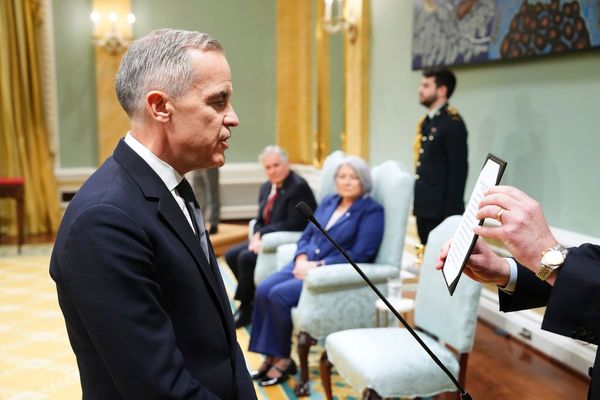“We can stop the chaos, turn the page, and start to rebuild our country,” declares Labour’s manifesto. With faith in politics at an all-time low, why should that slogan be any more credible than “stop the boats”? How much better can the Labour party make Britain, when its combined tax and spending promises amount to only 0.2% of GDP? And yet I could not help myself thinking: I actually want this. I would love to rebuild the country. I would love it if food banks came to feel like a dark Tory nightmare. I would love not to lurch from one catastrophe to the next. Slogans feel different when you want them.
Labour’s manifesto looks like a catalogue from which you can buy multiple Keirs – 36 poses across a range of moods, running the gamut from “businesslike” to “serious”. He appeared on the Manchester podium, sleeves rolled up in echo of his core message: that he will roll his sleeves up. He is still engaged in a bit of left-baiting, repeating that this is a “changed Labour party”. When a protester interrupted, he said, “We gave up being a party of protest five years ago. We want to be a party of power.”
Starmer also took proud ownership of his famous sense of caution – referring voters to Clacton, where Nigel Farage is standing, if they wanted “pantomime” – and managed expectations so fiercely that the expectations should take him to tribunal: “These challenges don’t disappear overnight,” he said. “We don’t have a magic wand,” he continued, some would say unnecessarily, given that he’d already explained there was no rabbit in his hat.
And yet, he didn’t get his missions handed to him by a political discourse that only cares about rightwing pensioners. He didn’t talk about “hardworking families”, he talked about working people, he talked about young people, he talked about the climate and green energy, he talked about the staff of the NHS as its lifeblood. He said, explicitly, that “economic growth is not something the few hand down to the many”. There were green shoots of a new fundamental principle, in which the wealth of a nation is in its people, and they don’t have to be endlessly sliced and diced by whether they’re a net contributor or net recipient.
Even while the tax and spending commitments are underwhelming, even though the bid to be “the party of business” was so formulaic, many of the policies included – free breakfast clubs in schools, the minimum wage linked to inflation, sick pay reforms, rail nationalisation – painted a different allegiance. And, after that salty question in Wednesday’s Sky debate as to whether or not he’s a robot, it was interesting to see a flash of unrobotic, you might say human, feeling: he looked genuinely angry about kids ending up in A&E because they couldn’t get to see a dentist. Keir Starmer’s politics are, well, the kindest word is probably “mercurial”. But his hatred of stuff that doesn’t work does seem to be authentic.
It’s often said that what isn’t in the manifesto is as important as what is: people were quick to notice that the NHS would now “always be publicly owned and publicly funded”, the previous tenet, “the NHS is not for sale”, having been excised. If there’s still £20bn to cut from public spending, it’s hard to see where from, when everything’s going to get better. The Labour loyalist and author John O’Farrell was helpfully on X, with one eye on the 1966 manifesto, during the speech: that Labour government legalised abortion, homosexuality, no-fault divorce, and ended theatre censorship, without mentioning any of it at election time. So here’s hoping for the spirit of 66, lads.
The sudden interest in the “normal person” at election time – suddenly everyone wants to vox-pop them, every debate wants to hear their questions, listening mode gets turned up to 11 – might have made you feel sceptical at the appearance of Daniel, Nathaniel and Holly before Keir’s speech. They are victims, respectively, of the housing and cost of living crisis, a crumbling NHS unable to diagnose cancer in time to cure it, and of being young in a Conservative era that holds you in contempt. But later, reminiscing with my 16-year-old about the 2010 election, when I took him and his sister to vote in a double buggy, it hit me like a fist how much pain and sorrow the last 14 years have brought to people. I really want the good stuff to be true, and the missing stuff to materialise later. Manifestos are different when you want them.
Zoe Williams is a Guardian columnist
Do you have an opinion on the issues raised in this article? If you would like to submit a response of up to 300 words by email to be considered for publication in our letters section, please click here.







